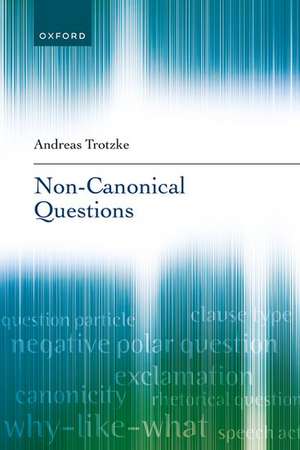Non-Canonical Questions
Autor Andreas Trotzkeen Limba Engleză Hardback – 16 noi 2023
Preț: 473.21 lei
Preț vechi: 654.57 lei
-28% Nou
Puncte Express: 710
Preț estimativ în valută:
90.57€ • 94.20$ • 75.90£
90.57€ • 94.20$ • 75.90£
Carte disponibilă
Livrare economică 10-15 februarie
Preluare comenzi: 021 569.72.76
Specificații
ISBN-13: 9780192872289
ISBN-10: 0192872281
Pagini: 224
Dimensiuni: 160 x 241 x 18 mm
Greutate: 0.47 kg
Editura: OUP OXFORD
Colecția OUP Oxford
Locul publicării:Oxford, United Kingdom
ISBN-10: 0192872281
Pagini: 224
Dimensiuni: 160 x 241 x 18 mm
Greutate: 0.47 kg
Editura: OUP OXFORD
Colecția OUP Oxford
Locul publicării:Oxford, United Kingdom
Recenzii
Adopting a syntactic approach, Andreas Trotzke provides a detailed account of all the main types of non-canonical questions - in situ questions, declarative questions, exclamatory questions - from a crosslinguistic perspective. Teasing apart emphasis and illocutionary force, he generalizes the role of emotional intensity and views emphatic word order as the expression of a propositional attitude that does not affect the illocutionary level. Interestingly, his demonstration encompasses the discourse effects of non-canonical questions, which are possibly used either as first moves or as second moves via pragmatic inferences. The book is a valuable addition to the literature on questions and non-canonicity, providing a wealth of information on indirect and mixed speech acts, and on the syntax-pragmatics interface.
This book offers a fresh, comprehensive, and crosslinguistically well-grounded analysis of non-canonical questions, providing an in-depth investigation of both the syntactic and the pragmatic factors involved; the author also sketches a new framework encompassing the defining properties of non-canonical questions at the syntax-pragmatics interface by exploring the role of emotional intensity and expressivity and their linguistic encoding. This work represents a significant contribution to our understanding of the grammatical representation of the pragmatic dimension of human language, with interesting implications for the theory of speech acts.
This book offers a fresh, comprehensive, and crosslinguistically well-grounded analysis of non-canonical questions, providing an in-depth investigation of both the syntactic and the pragmatic factors involved; the author also sketches a new framework encompassing the defining properties of non-canonical questions at the syntax-pragmatics interface by exploring the role of emotional intensity and expressivity and their linguistic encoding. This work represents a significant contribution to our understanding of the grammatical representation of the pragmatic dimension of human language, with interesting implications for the theory of speech acts.
Notă biografică
Andreas Trotzke is Professor in the Department of Linguistics at the University of Konstanz. His areas of expertise include syntax, pragmatics, and language education. He has been awarded several Invited Professorships and Visiting Scholarships, among them a 1-year scholarship at Stanford University (2016-2017), the prestigious Chair 2017 Empirical Foundations of Linguistics at Université Sorbonne Paris Cité/CNRS, and an IDEX Professorship (1re classe) at the Université de Bordeaux. He is the co-editor, with Xavier Villalba, of Expressive Meanings Across Linguistic Levels and Frameworks (OUP, 2021).
